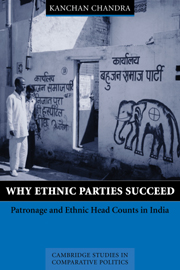Book contents
- Frontmatter
- Dedication
- Contents
- List of Maps, Figures, and Tables
- List of Abbreviations
- A Note on Terminology
- Acknowledgments
- 1 Introduction
- Part I Theory
- Part II Data
- 6 India as a Patronage-Democracy
- 7 The Bahujan Samaj Party (Bsp) and the Scheduled Castes (SCs)
- 8 Why Sc Elites Join the Bsp
- 9 Why Sc Elites Join the Bsp
- 10 Why Sc Voter Preferences Translate into Bsp Votes
- 11 Explaining Different Head Counts in the Bsp and Congress
- 12 Extending the Argument to Other Ethnic Parties in India: The Bjp, The Dmk, and The Jmm
- 13 Ethnic Head Counts and Democratic Stability
- Appendix A Elite Interviews
- Appendix B Ethnographies of Election Campaigns
- Appendix C Content Analysis
- Appendix D Description of Survey Data
- Appendix E Description of the Ecological Inference (EI) Method
- Appendix F Method Used to Estimate Ethnic Voting Patterns
- Bibliography
- Index
- Miscellaneous Endmatter
7 - The Bahujan Samaj Party (Bsp) and the Scheduled Castes (SCs)
from Part II - Data
Published online by Cambridge University Press: 19 October 2017
- Frontmatter
- Dedication
- Contents
- List of Maps, Figures, and Tables
- List of Abbreviations
- A Note on Terminology
- Acknowledgments
- 1 Introduction
- Part I Theory
- Part II Data
- 6 India as a Patronage-Democracy
- 7 The Bahujan Samaj Party (Bsp) and the Scheduled Castes (SCs)
- 8 Why Sc Elites Join the Bsp
- 9 Why Sc Elites Join the Bsp
- 10 Why Sc Voter Preferences Translate into Bsp Votes
- 11 Explaining Different Head Counts in the Bsp and Congress
- 12 Extending the Argument to Other Ethnic Parties in India: The Bjp, The Dmk, and The Jmm
- 13 Ethnic Head Counts and Democratic Stability
- Appendix A Elite Interviews
- Appendix B Ethnographies of Election Campaigns
- Appendix C Content Analysis
- Appendix D Description of Survey Data
- Appendix E Description of the Ecological Inference (EI) Method
- Appendix F Method Used to Estimate Ethnic Voting Patterns
- Bibliography
- Index
- Miscellaneous Endmatter
Summary
This chapter describes the Bahujan Samaj Party (BSP) and its target ethnic category, the Scheduled Castes. Section I provides a brief history of the BSP and locates it in the context of Indian politics. Section II discusses the Scheduled Castes. Section III describes the platform on which the BSP appeals to the Scheduled Castes and contrasts its platform with that of the Congress party, its principal competitor. Section IV describes the method that I employ to develop the hypothesis proposed in this book. Section V evaluates this hypothesis against the principal explanations for the variation in support for the BSP among Scheduled Castes proposed by informed observers of the BSP, including social scientists, media analysts, and BSP activists themselves. Subsequent chapters then develop and test the separate propositions contained in this argument.
History
The Bahujan Samaj Party was founded in 1984 by Kanshi Ram, a Ramdassia Sikh belonging to the Chamar caste category among the Scheduled Castes. Born in 1934 in a rural district in the north Indian state of Punjab, Kanshi Ram obtained a B.Sc. degree from a local college. He then entered one of the government positions “reserved” for Scheduled Caste candidates, first with the Survey of India and then with the government-owned Explosives Research and Development Laboratory in the city of Pune in the western state of Maharashtra.
Although he did not initially aspire to a political career, incidents of caste discrimination during his tenure in government service pushed him toward politics. While employed in the Pune Laboratory, Kanshi Ram became involved in an agitation by Scheduled Caste employees protesting the cancellation of an official holiday commemorating the birthday of Dr. B. R. Ambedkar, India's most prominent Scheduled Caste leader during the movement for independence from the British. He was suspended following an altercation with an upper-caste superior over this incident. He resigned from his job altogether in 1971 and, in 1973, founded the Backward and Minority Community Employees Federation (BAMCEF), a local association of government employees with the explicit purpose of increasing the political influence of the ethnic categories that they represented.
In its initial years, BAMCEF supported the activities of the Republican Party of India, then India's best-known Scheduled Caste party, with a base mainly in the state of Maharashtra.
- Type
- Chapter
- Information
- Why Ethnic Parties SucceedPatronage and Ethnic Head Counts in India, pp. 143 - 171Publisher: Cambridge University PressPrint publication year: 2004
- 1
- Cited by

